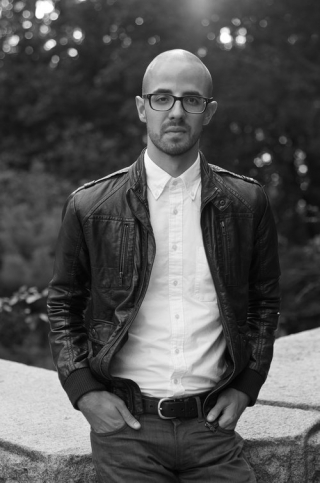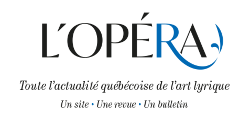ACTUALITÉS- ÉVÉNEMENTS- L'OPÉRA DE CHAMBRE CHAAKAPESH, LE PÉRIPLE DU FRIPON EN OUVERTURE DE LA 85e SAISON DE L'ORCHESTRE SYMPHONIQUE DE MONTRÉAL

Sous la direction de son chef Kent Nagano, l’Orchestre symphonique de Montréal inaugure sa 85e saison avec la création de Chaakapesh, le périple du fripon, un opéra de chambre basé sur une légende crie pour narrateur, deux solistes et orchestre de Matthew Ricketts et Tomson Highway. Des rites, danses et éloges à la Terre seront chantés par le ténor Owen McCausland et le baryton Geoffroy Salvas dans une mise en scène de Charles Dauphinais, accompagnés d’une narration en innu de Florent Vollant et de chants avec tambour de l’artiste inuite Akinisie Sivuarapik. La représentation du 8 septembre donnera lieu quant à elle à une narration en inuktitut.
Le Sacre du Printemps d’Igor Stravinsky et Le Boléro de Ravel pourront également être entendus lors de ce concert d’ouverture. Pour d'autres informations sur l'événement, vous pouvez consulter le site de l'OSM en cliquant ici.
Comme le rapportait Radio-canada lors du lancement de la saison 2018-2019 en avril dernier, cette œuvre pourra également être entendue dans trois villages inuits, une communauté crie et deux communautés innues où se rendra l’OSM du 9 au 19 septembre. Cette deuxième tournée de l'OSM en milieu autochtone, la première ayant eu lieu en 2008 et à l'occasion de laquelle Kent Nagano et sept instrumentistes avaient visité le Nunavik pour y interpréter L’histoire du soldat d’Igor Stravinsky, débutera au Nunavik où des arrêts sont prévus à Kuujjuaq, à Salluit et à Kuujjuarapik. Elle se poursuivra dans la communauté crie d’Oujé-Bougoumou et dans les communautés innues de Mashteuiatsh et de Uashat Mak Mani-Utenam.
Pour Kent Nagano, ce voyage permettra de repousser « les frontières physiques et artistiques de nos pratiques pour créer et mettre en commun des œuvres exceptionnelles, [de nouer] un dialogue avec différentes traditions [et de susciter] de nouvelles attentes à l’égard des orchestres symphoniques du XXIe siècle tout en répondant au mieux à un urgent besoin d’offrir des espaces de médiation et de réconciliation entre les populations autochtones et non autochtones ».
Le producteur Roger Frappier et une équipe de MAX FILMS (Hochelaga, terre des âmes) suivront l’OSM à travers les étapes préparatoires de la tournée, ainsi que durant les activités d’échanges culturels dans le but de tourner un documentaire.
*****
Les vues du compositeur et diplômé de l'École de musique Schulich de l'Université de McGill sur cette nouvelle oeuvre lyrique qu'il a composée sur le livret de l'écrivain cri Tomson Highway ont été présentées le 18 avril 2018 sur le site de l'école ici et nous reproduisons ces vues ci-après :
Matthew Ricketts to compose a new opera for the OSM’s 85 season opening

Matthew Ricketts
To open the Orchestre Symphonique de Montréal’s 85th season, composer Matthew Ricketts (BMus ’09) has been commissioned to write a new chamber opera. Titled “Chaakapesh, The Trickster’s Quest,” this work showcases two singers, narrator, and orchestra, in three scenes. To celebrate this exciting opportunity, we asked Matthew a few questions in a recent email exchange.
How did you become involved with this project?
I was brought on board by the OSM and Kent Nagano, with whom I had worked for before (I previously wrote an orchestra piece for the OSM—Blood Line—and a solo organ work—Highest Light). This project is also being spearheaded by Marc Wieser, who heads the Special Projects with the OSM, and someone I had also worked with previously.
How was the Chaakapesh legend chosen for your opera?
The libretto was written by Tomson Highway, a Cree playwright and central figure in this collaboration. It was he who ultimately choose the Cree legend of Chaakapesh—the divine trickster—for our story. Tomson’s libretto riffs on the traditional Cree story of The Trickster and The Sturgeon, akin to the Judeo-Christian Jonah and The Whale (and indeed similar to many myths from around the world).
Is this your first opera? What can you tell us about the experience so far?
This is in fact my second opera. The first, No Masque for No Measure (on a libretto by Lauren J. Rogener) was commissioned by and premiered at the Cluster New Music Festival in Winnipeg. Coincidentally enough, Marc Wieser was also involved in that production (as a pianist) long before he worked for the OSM, so our reunion here on another opera project feels very serendipitous yet well-fated! The experience working on Chaakapesh so far has been incredible. In December, Tomson, Marc and I spent time in Ivujivik, the northernmost settlement in Quebec, learning about the local culture, listening to the sounds and stories, and laying some of the groundwork for the opera libretto. I'm currently in the midst of composing the music—first writing a piano-vocal score, then expanding for 15 players (which will eventually tour some of Quebec's northern indigenous communities), and finally orchestrating for the full OSM. The latter is the version which will premiere September 6 and 8 at the Maison symphonique.
How have your relationships with Schulich professors developed since graduating in 2009?
Since graduating, I have kept in great and nearly constant contact with all of my composition professors from McGill: Brian Cherney, John Rea, and Chris Paul Harman. I consider them all friends as well as mentors and send them music, share news, bug them for letters of recommendation, and always see them whenever I'm in town. I was working particularly close with Brian Cherney since graduating, as he was the subject of my doctoral thesis at Columbia. I was furthermore on the organization committee of Illuminations: Brian Cherney at Seventy-Five, a conference which took place at the Schulich School of Music last October celebrating Brian's life, music, and legacy on the occasion of his 75th birthday year. In short, my teachers from Schulich have remained very much with me and have all been incredibly supportive of my work.
“Chaakapesh, The Trickster’s Quest” is one of the 200 exceptional projects funded through the Canada Council for the Arts’ New Chapter program. With this $35M investment, the Council supports the creation and sharing of the arts in communities across Canada. Read more about the project.

